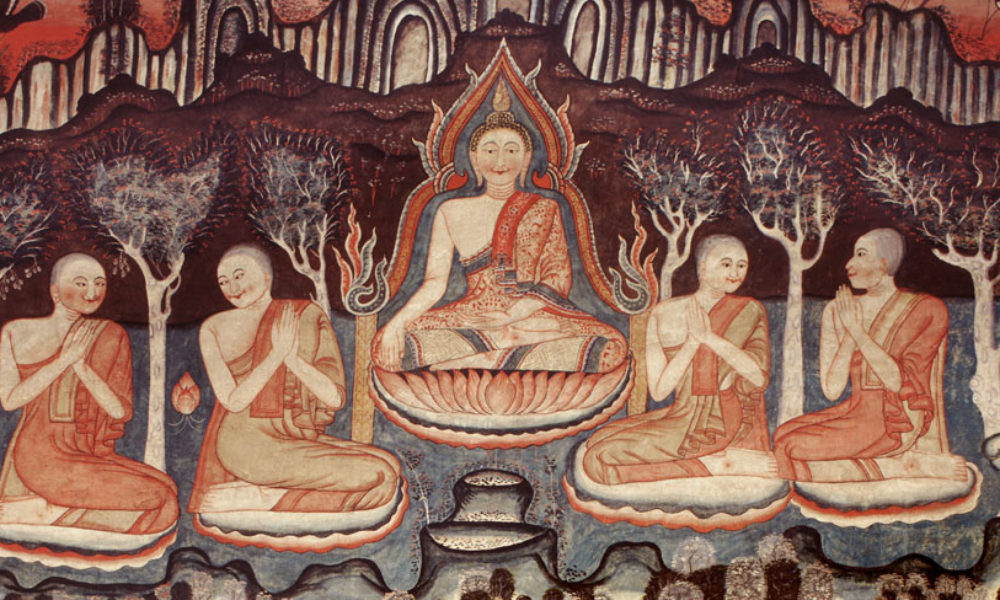We all think that fear is awful and painful, yet the Buddhists—the master psychologists for thousands of years—don’t include fear in the long list of mental afflictions contained in the core teachings on Buddhist psychology.
Fear is a healthy thing, in general. It is awareness of danger. Fear is protective; it’s what helps us to avoid wandering into a hungry lion’s den.
But so much of our suffering—as individuals and as a society—is caused by fear. We can be made to do things out of fear, or to do nothing out of fear. Fear also stops us from speaking up when we know we should. We have a fear of being still.
Fear arises the moment you ask yourself, what is this all about? Inevitably, it has nothing to do with right now. It has to do with the future, but the future doesn’t exist. The only thing you’ve got is what’s right here, right now. And coming home to the moment makes all the difference in the world in how you deal with fear.
How do we work with fear?
It is very important to know where it begins, so we can get off on the right foot. You examine fear and dissect it into its components. Where does it arise? What is the sensation when you feel afraid? What kind of thoughts race through your mind when you are in a state of fear? What’s your particular pattern? Do you panic? Do you freeze?
At this stage in the path, you try to understand your experience, try to break it down and it would be helpful to write it down.
Understanding, examining, knowing, slowing down—those are the first steps in working with fear, the beginning of the path to fearlessness.
This power comes directly out of meditation. Each time you acknowledge a thought, let it go, and come back to the moment, you build the power of concentration. The more you sit, the deeper you sit, the more concentration you build, and the closer you come to the falling away of body and mind.
All the fears are not going to just magically disappear. We will need to develop stability and insight. Looking deeply in our fears shows us its nature and teaches us how to work with it.
As we look deeply, we can see that there is not an object of fear separate from the subject who is afraid.
Guided Meditation on Overcoming Fear
Fear is a natural emotion that we all experience at various points in our lives. However, it can often hold us back from fully experiencing and enjoying life. This guided meditation aims to help you acknowledge and release your fears, allowing you to cultivate a sense of calm and courage within yourself.
Step-by-Step Instructions:
- Preparation:
- Find a quiet and comfortable space where you won’t be disturbed for the duration of the meditation.
- Sit or lie down in a comfortable position, with your spine straight and your body relaxed.
- Take a few deep breaths, inhaling through your nose and exhaling through your mouth, allowing yourself to settle into the present moment.
- Setting Intentions:
- Close your eyes and take a moment to reflect on the fears that are currently present in your life.
- Set the intention to acknowledge and release these fears, allowing yourself to move forward with courage and confidence.
- Deep Relaxation:
- Begin by focusing on your breath, observing the natural rhythm of inhalation and exhalation.
- With each exhale, imagine releasing any tension or resistance in your body, allowing yourself to sink deeper into relaxation.
- Visualization:
- Visualize yourself surrounded by a warm, comforting light, radiating from within you.
- As you breathe in this light, feel it filling you with a sense of peace and security, dispelling any darkness or doubt.
- Confronting Fear:
- Now, bring to mind one specific fear that you would like to address during this meditation.
- As you hold this fear in your awareness, remind yourself that it is merely a passing emotion and does not define who you are.
- Embracing Courage:
- Shift your focus to the qualities of courage and strength that reside within you.
- Imagine yourself standing tall and confident, ready to face whatever challenges may come your way.
- Affirmations:
- Repeat the following affirmations silently to yourself:
- “I am strong. I am resilient. I am capable of overcoming my fears.”
- “I release all fear and embrace courage in its place.”
- “I trust in my ability to navigate life’s uncertainties with grace and ease.”
- Breath Awareness:
- Return your attention to your breath, using each inhale to draw in a sense of empowerment and each exhale to release any lingering fear or doubt.
- Gratitude and Closure:
- Take a moment to express gratitude for this opportunity to confront and release your fears.
- When you’re ready, gently open your eyes and carry this sense of courage and empowerment with you as you continue with your day.
Conclusion:
May this guided meditation on overcoming fear serve as a source of strength and inspiration as you navigate life’s challenges with courage and resilience. Remember that fear is merely an illusion, and you have the power to transcend it and embrace a life filled with joy and possibility.




